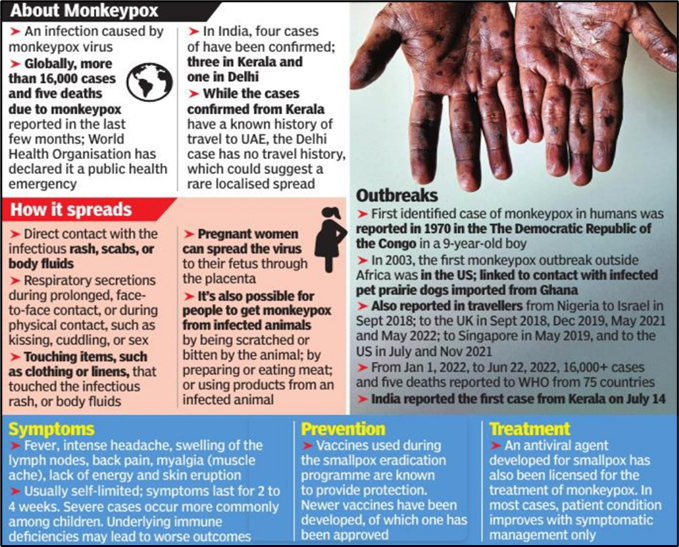Why in news?
The WHO has declared monkeypox a public health emergency of international concern, with the Democratic Republic of the Congo and other African countries being severely affected.
Since 2022, there have been 99,176 cases and 208 deaths reported from 116 countries. What seems to be worrisome is the spread of a new sexually transmissible strain of the virus.
What’s in today’s article?
- WHO – About, WHO and India
- What does declaration as a PHEIC mean?
- Monkeypox
- What is the reason for the current concern?
- Risk for India
World Health Organisation
- About:
- Founded in 1948, it is the UN agency responsible for global public health. It has 194 member states.
- It is based in Geneva, Switzerland.
- It is involved in vaccination campaigns, health emergencies and supporting countries in primary care.
- It is funded by a combination of members' fees based on wealth and population and voluntary contributions.
- India & WHO:
- India became a party to the WHO in January 1948. India is a member state of the South East Asia Region at the WHO.
- The first regional director for South East Asia was an Indian, Dr Chandra Mani, who served between 1948-1968.
- Currently, the post has again been occupied by an Indian appointee, Dr Poonam Khetrapal Singh, who has been in office since 2014.
- Dr Soumya Swaminathan served as WHO’s chief scientist (2019-2022).
What does declaration as a PHEIC mean?
- A PHEIC is declared for an extraordinary event which is determined to constitute a public health risk to other States through the international spread of disease.
- PHEIC label by WHO is designed to trigger a coordinated international response and could unlock funding to collaborate on sharing vaccines and treatments.
Monkeypox:

- About
- It is a rare zoonotic viral disease belonging to the Orthopoxvirus genus in the Poxviridae family, the same virus family as smallpox.
- Zoonotic diseases are those disease that spread from animals to humans.
- It was first discovered in animals in 1958 when two outbreaks occurred in captive monkey colonies kept for research purposes. Hence, the name ‘monkeypox’.
- Treatment
- There is currently no specific treatment for monkeypox. However, the Vaccinia vaccine, which was used against smallpox, had shown 85% efficacy in monkeypox prevention.
What is the reason for the current concern?
- The spread of clade Ib of the mpox virus (MPXV), primarily transmitted through sexual contact, is causing concern.
- Historically, clade I infections, which are deadlier than clade II, spread through zoonotic events, but sexual transmission of clade I was previously unreported.
- Over 100 cases of clade Ib have emerged in countries neighboring the DRC—Burundi, Kenya, Rwanda, and Uganda—where mpox was not previously reported.
- This, alongside a rise in total mpox cases to over 15,600 and 537 deaths this year, underscores the urgency of a coordinated international response.
- WHO Director-General Dr. Tedros emphasized the need to control these outbreaks, as recent research shows the virus is now spreading human-to-human and rapidly mutating into new lineages.
Risk for India
- The first case of the more contagious clade Ib mpox infection outside Africa was reported in Sweden, raising concerns that it could spread to other countries through global travel.
- During the 2022 outbreak, India reported 27 cases and one death, primarily from the less deadly clade II, with infections initially linked to international travel but later spreading locally.
- Experts emphasized that the current surge of mpox in Africa, coupled with the spread of a new sexually transmissible strain, is a global emergency.









